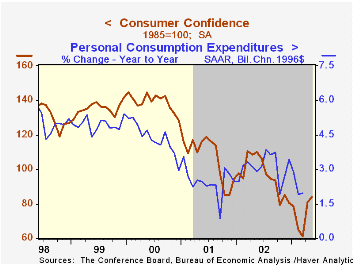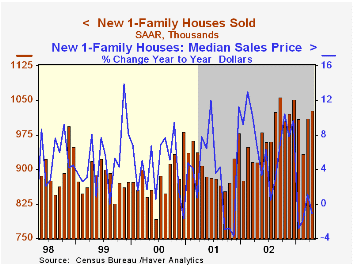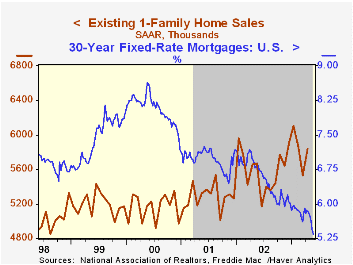 Global| May 27 2003
Global| May 27 2003Consumer Confidence Up Again
by:Tom Moeller
|in:Economy in Brief
Summary
The Conference Boards Index of Consumer Confidence rose slightly more than expected in May. The index rose 3.5% m/m to 83.8 and added to a 31.9% jump the prior month. Consensus expectations were for a rise to 82.5. Since December of [...]

The Conference Board’s Index of Consumer Confidence rose slightly more than expected in May. The index rose 3.5% m/m to 83.8 and added to a 31.9% jump the prior month. Consensus expectations were for a rise to 82.5.
Since December of last year, Confidence has risen 3.8% to a six month high. That recovery is just behind a 7.5% rise in the University of Michigan's Consumer Sentiment.
The surge in confidence reflected an 11.3% rise in consumer expectations to the highest level since September. The present situation index fell 9.7%.
Jobs were viewed as hard to get by a record 32.6% of survey respondents. The index more than recouped all of its decline the prior month. Expectations for employment opportunities in six months improved.
During the last five years there has been a 75% correlation between the level of Consumer Confidence and the y/y change in real consumer spending.
The Conference Board's survey is conducted by a mailed questionnaire to 5,000 households and about 3,500 typically respond.
| Conference Board | May | April | Y/Y | 2002 | 2001 | 2000 |
|---|---|---|---|---|---|---|
| Consumer Confidence | 83.8 | 81.0 | -24.0% | 96.6 | 106.6 | 139.0 |
by Tom Moeller May 27, 2003

Sales of new single family homes rose slightly more than expected last month. Sales rose 1.7% to 1,028M versus March which was revised higher. Consensus expectations were for a 980,000 April sales rate.
Sales fell 17.8% m/m in the Northeast region of the country after more than doubling in March. That spurt was partially a recovery from February sales depressed by severe Winter weather. March sales were revised up.
Elsewhere in the country sales rose: up 13.4% (9.4% y/y) in the Midwest; up 4.3% (-0.7% y/y) in the West; and up 0.6% (15.7% y/y) in the South.
The median price of a new home fell slightly to $185,100 (-1.1% y/y) but the prior month was revised up sharply.
The new home sales data reflect current sales versus the existing home sale figures which reflect closings on past sales.
| Homes Sales (000s, AR) | April | Mar | Y/Y | 2002 | 2001 | 2000 |
|---|---|---|---|---|---|---|
| New Single-Family | 1,028 | 1,011 | 12.2% | 977 | 907 | 880 |
by Tom Moeller May 27, 2003

Sales of existing single family homes rose much more than expected last month. The 5.6% m/m jump recovered virtually all of a sharp decline in March.
Home sales in April rose sharply in each of the country's regions.
The median price of an existing home rose slightly for the third consecutive month to $163,400 (+6.8% y/y). Prices in March were revised down.
The figures reflect closings of past home sales.
| Existing Home Sales (000, AR) | April | Mar | Y/Y | 2002 | 2001 | 2000 |
|---|---|---|---|---|---|---|
| Existing Single-Family | 5,840 | 5,530 | 3.2% | 5,598 | 5,282 | 5,158 |
Tom Moeller
AuthorMore in Author Profile »Prior to joining Haver Analytics in 2000, Mr. Moeller worked as the Economist at Chancellor Capital Management from 1985 to 1999. There, he developed comprehensive economic forecasts and interpreted economic data for equity and fixed income portfolio managers. Also at Chancellor, Mr. Moeller worked as an equity analyst and was responsible for researching and rating companies in the economically sensitive automobile and housing industries for investment in Chancellor’s equity portfolio. Prior to joining Chancellor, Mr. Moeller was an Economist at Citibank from 1979 to 1984. He also analyzed pricing behavior in the metals industry for the Council on Wage and Price Stability in Washington, D.C. In 1999, Mr. Moeller received the award for most accurate forecast from the Forecasters' Club of New York. From 1990 to 1992 he was President of the New York Association for Business Economists. Mr. Moeller earned an M.B.A. in Finance from Fordham University, where he graduated in 1987. He holds a Bachelor of Arts in Economics from George Washington University.
More Economy in Brief
 Global| Feb 05 2026
Global| Feb 05 2026Charts of the Week: Balanced Policy, Resilient Data and AI Narratives
by:Andrew Cates






